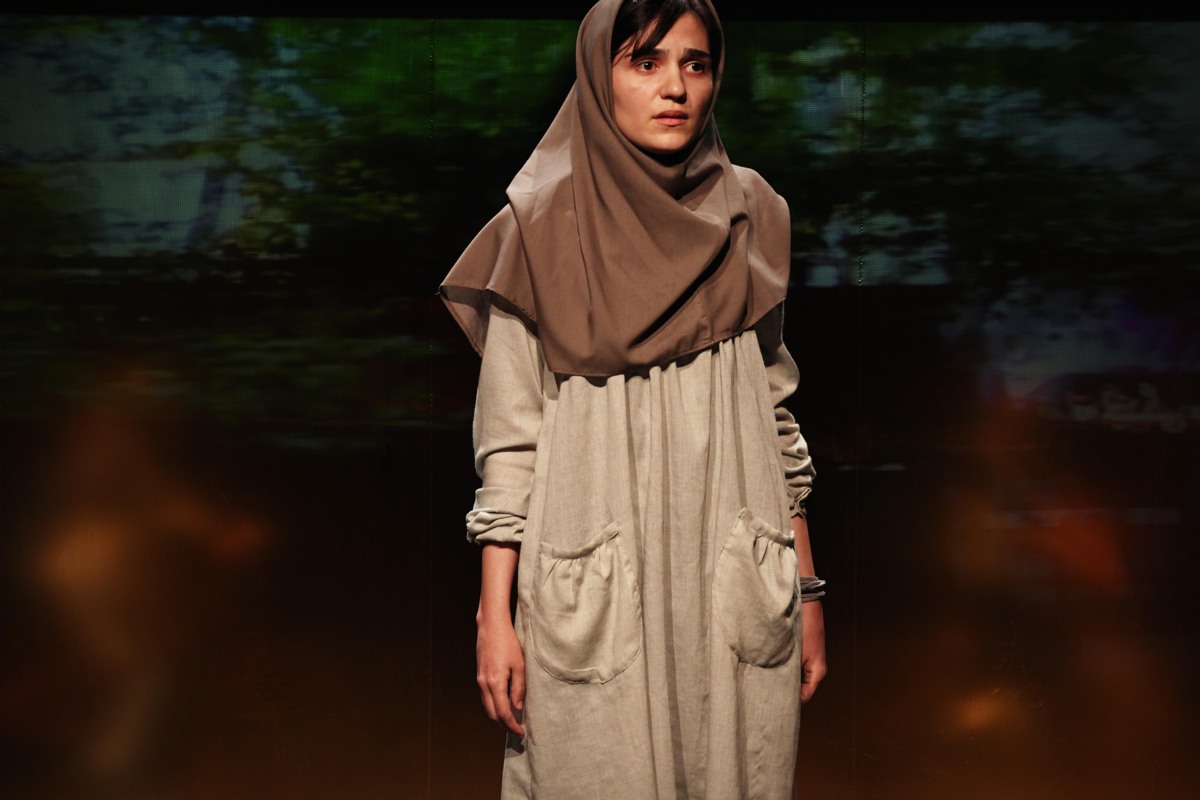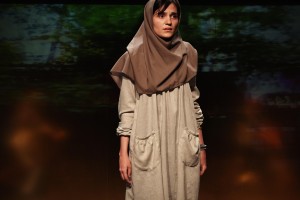HEARING
assistant director Mohammad Reza Hosseinzadehwith Mona Ahmadi, Ainaz Azarhoush, Elham Korda, Mahin Sadri
video Ali Shirkhodaei
music Ankido Darash and Kasraa Paashaaie
sound Ankido Darash
light design Saba Kasmaei
stage design Amir Reza Koohestani assisted by Golnaz Bashiri
costumes & props Negar Nemati
second assistant Mohammad Khaksari
stage manager Mohammad Reza Najafi
costumes assistant Negar Bagheri
show in Farsi with supertitles
translation to English/French and supertitles adaptation Massoumeh Lahidji
running time 1h10
production Mehr Theatre Group
coproduction La Bâtie – Festival de Genève, Künstlerhaus Mousonturm Frankfurt am Main, BOZAR – Centre for Fine Arts Brussels
production managers Mohammad Reza Hosseinzadeh and Pierre Reis
company & tour manager Pierre Reis
Hearing was written during a residency at the Akademie Schloss Solitude (October 2014 – March 2015) in Stuttgart, Germany.
http://www.mehrtheatregroup.com/videos
NOTE BY AMIR REZA KOOHESTANI
About a year or two ago, when I was watching Abbas Kiarostami’s Homework for the second (or third) time, I thought that these little boys who in response to Kiarostami’s supposedly simple questions such as “What is encouragement?” or “Have you done your homework?”, stare at the camera and ceiling, looking dizzy and hazy, seem so weird. I don’t want to “say” sick, but if nowadays a child gets this much afraid of being alone with a camera group in a closed room that he cries and asks them not to close the door, certainly they would take him to a therapist and psychiatrist.
But amid the war days, under Saddam’s missile strikes which the main aim was downrightly resistance and survival, there were not much people, except some such as Kiarostami, who thought about children’s mental and emotional health.
A while after, I heard that one of the film’s kids named Bahman, was Kiarostami’s own son.
I remembered that in the first meeting I had with Kiarostami, when he heard that I was born in 1978, he said my son is your age too. Therefore, these kids are an image of my child hood too. I looked like this too (If I wasn’t worse). So how come that a person with this kind of childhood intends to recognize his society’s best, as an intellectual?
In this play I want to find a connection between our fate today and that childhood and adolescence which we lived during the war and after that. Though the difference is that unlike Kiarostami’s film, I want to pursue female roles.
SYNOPSIS
The girls’ dormitory was always like an unattainable castle.
The doors and windows had thousand kinds of fences, locks, barriers, with thick glasses and guards and the arrests at the entrance. After the entrance door, a female world begun in which the entree of any man was prohibited. Mahin, my girlfriend and actress of my latest plays – and probably the actress playing the role for the warden – who has lived in one the same University dormitories for a year, says: “If one technician was supposed to come and fix the air conditioner, before he came up, they would announce it in the microphone that way: ‘Dear girls, please observe your hijab, a man wants to come upstairs’.”
Now, presume that in a situation like this, one day, a girl reported that she had heard a man in one of the rooms. This would be the starting point of the performance.
AMIR REZA KOOHESTANI
Amir Reza Koohestani was also commissioned by the Schauspielhaus in Koln, where he wrote and staged Einzelzimmer (2006), and by the Nouveau Théâtre de Besançon, with Japanese director Oriza Hirata and French director Sylvain Maurice, to create the play Des Utopies ? (2009) on tour in France and Japan.
After two years of studies in Manchester, Amir Reza Koohestani returned back to Tehran in July 2009 and created the play Where Were You on January 8th?, which has been on tour in Europe, Brazil, Japan…
In October 2011, despite finishing his military service, Amir Reza Koohestani created the adaptation of Ivanov by Anton Chekhov, successfully staged in Tehran for several weeks.
In February 2012, the movie Modest Reception, which script was co-written by Koohestani and Mani Haghighi – actor and film director – wins the Netpac Award at the Berlin International Film Festival 2012. In September 2012, he created the performance The Fourth Wall, adapted from the play England by Tim Crouch which was presented a hundred times in an art gallery in Tehran.
In 2013, Festival actoral in Marseille (France) has commissioned Koohestani to write and stage a new play, Timeloss (based on his previous play Dance on Glasses), succesfully staged across Europe, in New York and Los Angeles.
From October 2014 to March 2015, Amir Reza Koohestani was on a residency at the Akademie Schloss Solitude, in Stuttgart, where he wrote his last play Hearing, premiered at the City Hall of Tehran on the 15th July 2015 and now on tour in Europe. He has been also commissionned to write and direct a play for the Theater Oberhausen, in Germany, premiered on the 30th October 2015.
Mehr Theatre Group was created in 1996. The aim was to create a new type of theater — far from the traditional Iranian theater — based on new stage direction and a new acting style influenced by film. At first, Amir Reza Koohestani joined the Mehr Theatre Group to participate in their acting workshop, but after 6 months of the workshop they decided to produce theater productions based on their training. Since Amir was the only one with writing background he dedicated his time to write for the theater. In 1999, Koohestani’s new play, The Murmuring Tales, won several awards in the International Fadjr Festival in Tehran, which was a turning point for the company to present their works in the main theater festivals of Iran. At the age of 23, Amir wrote and staged Dance on Glasses in Shiraz (Iran), his birth city. This very personal play was an attempt to get away from the pain after breaking up with his girlfriend.
What he did not expect was to attract the attention of several theater curators who saw the work. The play went on tour for four years around the world, and thanks to the international tours, his following plays and tours were produced by international theater festivals such as the Kunstenfestivaldesarts (Brussels), the Wiener Festwochen (Vienna), the Holland Festival, and the Theaterformen Festival in Germany.
In 2005, he started his collaboration with a French production office based in Paris (and met Pierre Reis) which carried his international tours (2005-2008). In 2008, the Mehr Theatre Group became a French based association dealing with the major part of international tours of Koohestani’s productions. In 2013, the Mehr Theatre Group produced Mahin Sadri’s new play, Belayer, to open a new window for other members of the company to develop the aesthetic of Mehr Theatre Group.
The Mehr Theatre Group is one the most well know Iranian theater companies in Iran and has gained international acclaim with successful performances across the world. The company has won awards for Best Theater Company in Iran (2010), First Best Theater Production in Iran for Ivanov (2011), First Best Theater Production in Iran for The Fourth Wall (2012), Second Best Theater Production in Iran for Timeloss (2013).


